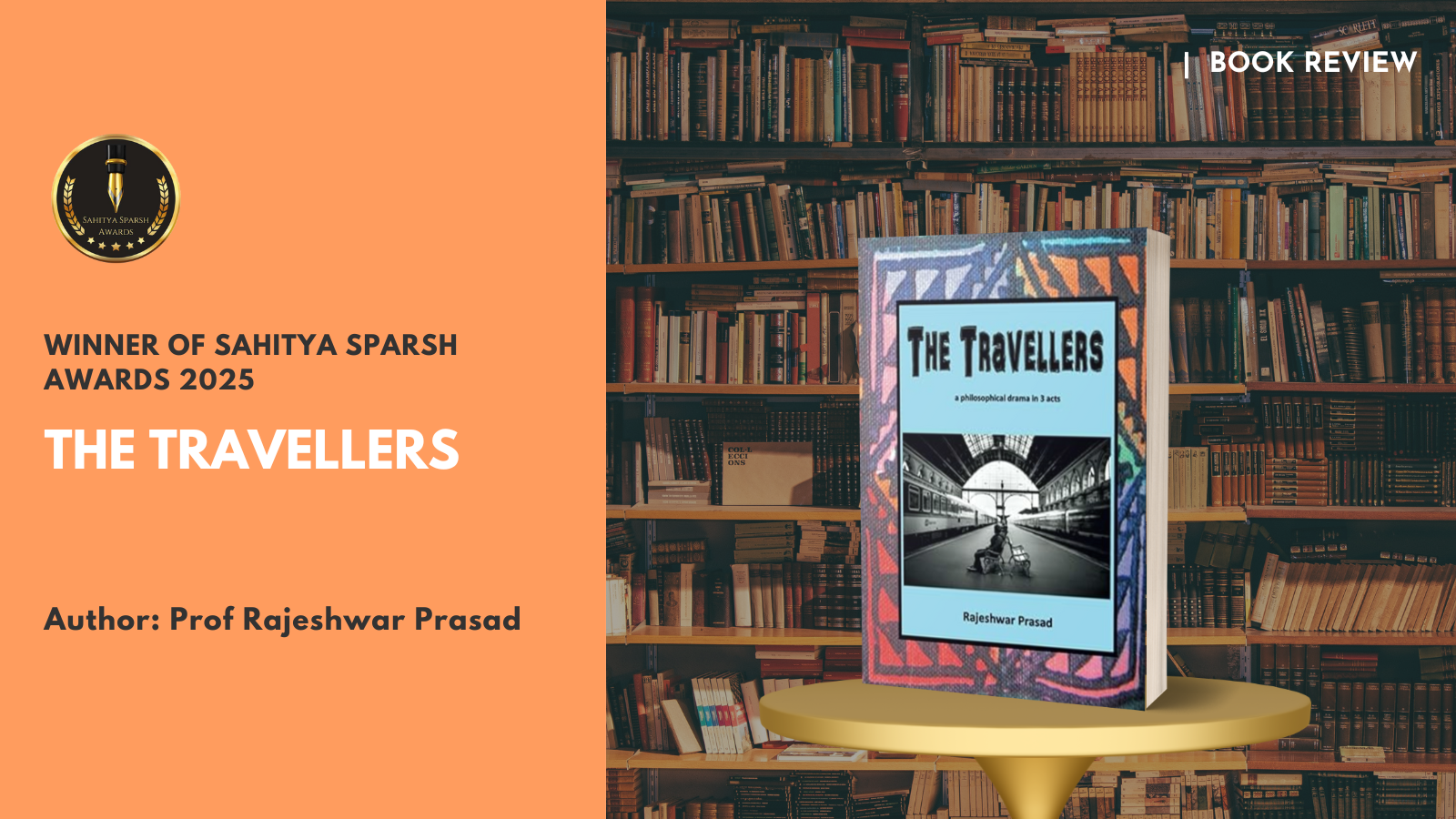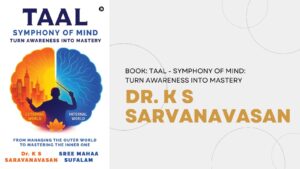The Travellers by Rajeshwar Prasad
In The Travellers the absurdity of life – a world without God and joy – is brought to consciousness through the encounters of Alvin, Cecil and Blair at a train station. It is underpinned by the philosophy of atheistic existentialism as depicted in works by Samuel Becket, Eugene Ionesco, Jean Genet, Harold Pinter and Edward Albee. The Travellers is a play in three acts which has all the features of absurd plays – with the absurdist formula of (aclp2t) + (afi2lms) + (tc) – action is reduced – characters are reduced – language is reduced – plot is reduced – place is reduced – the sense of alienation, fear, isolation, insecurity, loneliness, mystery and suspense – and the tragic-comic scenes – nothing is happening – but everything is happening.
Book Review: “The Travellers” by Rajeshwar Prasad – Sahitya Sparsh Award 2025 Winner for Philosophical Drama
Rajeshwar Prasad’s The Travellers, winner of the prestigious Sahitya Sparsh Award 2025 in the Philosophical Drama category, is a masterful exploration of existentialism and the absurdity of human existence. This play, presented in three acts, delves into the alienation, fear, and existential dread of a world devoid of God and joy.
Synopsis
The narrative unfolds at a seemingly unremarkable train station where three characters—Alvin, Cecil, and Blair—grapple with the futility of their lives and the inability to find meaning or purpose. Through their encounters, Prasad deftly mirrors the philosophy of atheistic existentialism, echoing the works of literary giants like Samuel Beckett, Eugene Ionesco, and Harold Pinter.
Absurdist Elements
At the heart of The Travellers lies the quintessential formula of absurdist drama:
- Reduction in Action, Characters, and Setting: The plot is stripped down to its bare essentials, mirroring the simplicity of the station setting.
- Language and Plot Minimalism: The dialogues are sparse yet poignant, underscoring the inefficacy of communication in capturing the complexity of human emotion.
- Themes of Alienation and Insecurity: The play masterfully portrays feelings of isolation, fear, and existential loneliness, making it deeply relatable for audiences navigating an uncertain world.
- Tragicomic Undertones: Prasad’s use of humor interwoven with despair—where nothing happens, yet everything is happening—emulates the style of absurdist greats.
Philosophical Underpinnings
Drawing heavily on the ideas of Jean Genet, Edward Albee, and the existentialist school of thought, The Travellers poses fundamental questions about life, death, and the human condition. Prasad’s writing challenges the audience to confront life’s absurdities while embracing the mystery and suspense that define existence.
Why “The Travellers” Deserves Recognition
This play is more than a literary work; it’s a philosophical dialogue that resonates with those who seek meaning in a chaotic world. Its minimalist staging, rich emotional undertones, and profound themes make it a significant contribution to contemporary drama.
Conclusion
The Travellers by Rajeshwar Prasad is a must-read for fans of philosophical and absurdist drama. With its thought-provoking narrative and evocative characters, it joins the ranks of timeless classics in the genre. Whether you’re a theater enthusiast, philosophy aficionado, or simply a seeker of profound storytelling, this Sahitya Sparsh Award-winning play offers an unforgettable journey through the labyrinth of existence.
Author’s Biography
Rajeshwar Prasad was born on 26 August 1970. As an academician deeply entrenched in the world of English literature brings to his works not only his academic credentials – a PhD on “Lyricism in the Plays of Christopher Marlowe” from Magadh University, Bodh-Gaya and his tenure as Professor and Head of the Department of English at Sarvodaya Post-Graduate College, Ghosi, Mau, UP, India – but also a profound passion for storytelling and philosophical exploration. His literary journey includes a diverse portfolio of works, such as the plays “The Travellers”, “The Wife”, “Zero into Four” and “The Tribute” – his fiction “Righteousness” – his works of poetry such as “Gandhi – the Messiah” and “Bullet Land” – all published by TSL Publications, UK. Additionally, his great epical work “The Gandhi-Gita”, his novel “Dance of Democracy”, as well as his essay “Hello Life”, further highlight his commitment to delving into the complexities of the human condition through various literary forms. He has also published more than two dozen research articles.
As an Indo-English poet, playwright, novelist, and essayist his literary explorations strive for a fair world and happy individuals, and he seems much more a teacher, thinker, and philosopher than a writer. His works seem like philosophical speculation, and his stories passing through various literary steps end with a very positive message to mankind and the world.
Prasad’s current article entitled “Gandhian Whirlwind and the Image of Mahatma Gandhi in Indo-English Fiction” has been published in the reputed US journal The Aerial Perspective.
Beyond his published works, he is honoured to serve as a Member of the Board of Studies at Maharaja Suhel Dev University, Azamgarh, and as a Fellow Member of the Screenwriters Association, Mumbai. For him, teaching and writing are not merely professions but sustenance for the soul – endeavours that allow him to continuously engage with and contribute to the literary and philosophical discourse.




